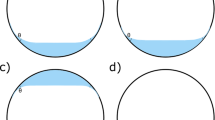Abstract
We evaluated the toxicity of very low viscosity (100 centistokes) and higher viscosity silicone oil (5000 centistokes) in rabbit eyes as a short-to-long-term postoperative vitreous substitute (6 weeks to 5 months). Emulsification of 100-cs and 5000-cs silicone oil did not occur in eyes which were followed for as long as 5 months. No toxic effects to retinal cells were detected by light or electron microscopy. Because no toxic effects were seen with 100-cs silicone oil, it can be used in an outpatient setting as a short-term postoperative tamponading agent. Electroretinographic responses of silicone-injected eyes were normal.
Similar content being viewed by others
References
Gonvers M, Hornung JP, de Courten C. The effect of liquid silicone on the rabbit retina: histologic and ultrastructural study. Arch Ophthalmol 1986; 104: 1057-62.
Lee PF, Donovan RH, Mukai N, Schepens CL, Freeman HM. Intravitreous injection of silicone: an experimental study. I. Clinical picture and histology of the eye. Ann Ophthalmol 1969; 1 (2): 15–25.
Mukai N, Lee PF, Schepens CL. Intravitreous injection of silicone: An experimental study. II. Histochemistry and electron microscopy. Ann Ophthalmol 1972; 4: 273–87.
Mukai N, Lee PF, Oguri M, Schepens CL. A long-term evaluation of silicone retinopathy in monkeys. Can J Ophthalmol 1975; 10: 391–402.
Stone W Jr. Alloplasty in surgery of the eye. N Engl J Med 1958; 258: 486–90.
Armaly MF. Ocular tolerance to silicone. Replacement of aqueous and vitreous by silicone fluids. Arch Ophthalmol 1962; 68: 390–5.
Levine AM, Ellis RA. Intraocular liquid silicone implants. Am J Ophthalmol 1963; 55: 939–43.
Labelle P, Okun E. Ocular tolerance to liquid silicone: an experimental study. Can J Ophthalmol 1972;7: 199–204.
Ober RR, Blanks JC, Ogden TE, Pickford M, Minckler DS, Ryan SJ. Experimental retinal tolerance to liquid silicone. Retina 1983; 3: 77–84.
Suzuki M, Okada T, Takeuchi S, Ishii Y, Yamashita H, Hori S. Effect of silicone oil on ocular tissues. Jpn J Ophthalmol 1991; 35: 282–91.
Pastor JC, Lopez MS, Saornil MI, Refojo MF. Intravitreal silicone and fluorosilicone oils. Pathologic findings in rabbit eyes. Acta Ophthalmologica 1992; 70: 651–8.
Thresher RJ, Ehrenberg M, Machemer R. Gas-mediated vitreous compression: an experimental alternative to mechanized vitrectomy. Graefes Arch Clin Exp Ophthalmol 1984; 221: 192–8.
Cibis PA, Becker B, Okun E, Canaan S. The use of liquid silicone in retinal detachment surgery. Arch Ophthalmol 1962; 68: 590–9.
Leaver PK, Lean JS. Management of giant retinal tears using vitrectomy and silicone oil/fluid exchange: a preliminary report. Trans Ophthalmol Soc UK 1981; 101: 189–91.
Lean JS, Leaver PK, Cooling RJ, McLeod D. Management of complex retinal detachments by vitrectomy and fluid/silicone exchange. Trans Ophthalmol Soc UK 1982; 102: 203–5.
McLeod D. Silicone-oil injection during closed microsurgery for diabetic retinal detachment. Graefes Arch Clin Exp Ophthalmol 1986; 224: 55–9.
Silicone Study Group. Vitrectomy with silicone oil or sulfur hexafluoride gas in eyes with severe proliferative vitreoretinopathy: results of a randomized clinical trial. Silicone study report 1. Arch Ophthalmol 1992; 110: 770–9.
Silicone Study Group. Vitrectomy with silicone oil or perfluoropropane gas in eyes with severe proliferative vitreoretinopathy: results of a randomized clinical trial. Silicone study group report 2. Arch Ophthalmol 1992; 110: 780–92.
Thaler A, Lessel MR, Gnad H, Heilig P. The influence of intravitreously injected silicone oil on electrophysiological potentials of the eye. Doc Ophthalmol 1986; 62: 41–6.
Foerster MH, Esser J, Laqua H. Silicone oil and its influence on electrophysiologic findings. Am J Ophthalmol 1985; 99: 201–6.
Momirov D, van Lith GHM, Zivojnovic R. Electroretinogram and electrooculogram of eyes with intravitreously injected silicone oil. Ophthalmologica 1983; 186: 183–8.
Crisp A, de Juan E Jr, Tiedeman J. Effect of silicone oil viscosity on emulsification. Arch Ophthalmol 1987; 105: 546–50.
Heidenkummer HP, Kampik A, Thierfelder S. Emulsification of silicone oils with specific physicochemical characteristics. Graefes Arch Clin Exp Ophthalmol 1991; 229: 88–94.
Heidenkummer HP, Kampik A, Thierfelder S. Experimental evaluation of in vitro stability of purified polydimethylsiloxanes (silicone oil) in viscosity ranges from 1000 to 5000 centistokes. Retina 1992; 12 (3): S28-S32.
Hutton WL, Fuller DG. Silicone oil in treatment of retinal disease. Ophthalmol Clin North America 1994; 7 (1): 89–99.
De Juan E Jr, McCuen B, Tiedeman J. Intraocular tamponade and surface tension. Surv Ophthalmol 1985; 30: 47–51.
Author information
Authors and Affiliations
Rights and permissions
About this article
Cite this article
Soheilian, M., Peyman, G.A., Moritera, T. et al. Experimental retinal tolerance to very low viscosity silicone oil (100 cs) as a vitreous substitute compared to higher viscosity silicone oil (5000 cs). Int Ophthalmol 19, 57–61 (1995). https://doi.org/10.1007/BF00156421
Accepted:
Issue Date:
DOI: https://doi.org/10.1007/BF00156421




